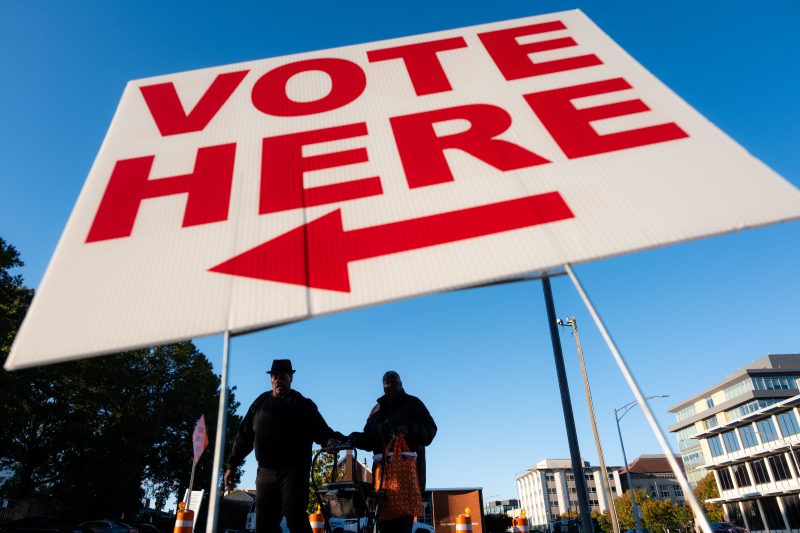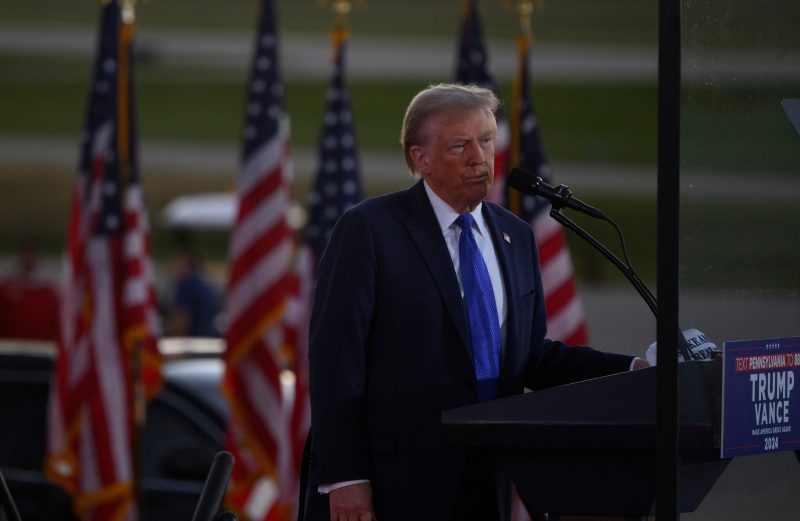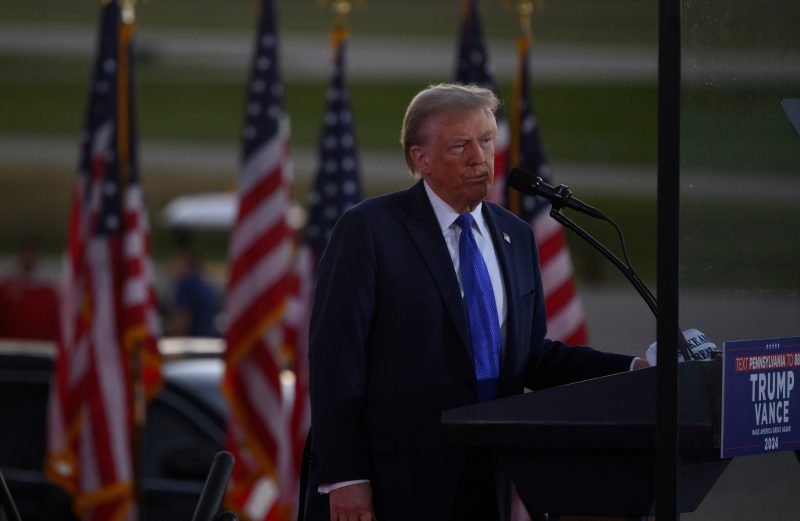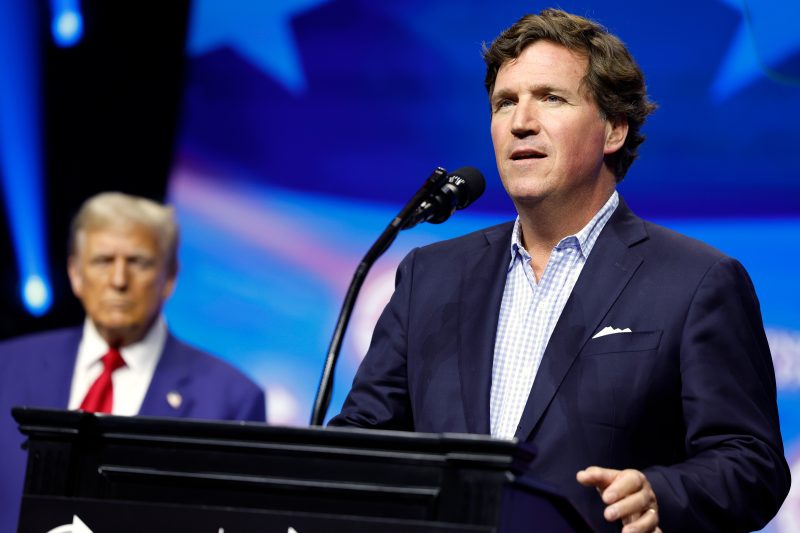
Could Trump undermine the vote again? Harris’s legal team says it’s not worried.
Former president Donald Trump and his allies have filed hundreds of lawsuits, with more to come, seeking to tighten voting rules or disqualify voters. Security experts have gamed out how to restore order quickly if unrest at polling locations shuts down voting for hours on end. Election administrators in several states have purchased panic buttons for their poll workers to use in the event of violence.
Despite all of that, Vice President Kamala Harris’s legal team claims they are sure that this year’s presidential election will be secure, fair and free — if not entirely without problems.
Over multiple interviews with the campaign’s top legal advisers, the Harris campaign projected confidence that the 2024 presidential election will ultimately succeed in delivering a clear winner, with eligible voters able to cast ballots, the ballots being properly tabulated and Congress certifying the electoral college count on Jan. 6, 2025.
“There’s not an awful lot that does keep me up at night,” said Eric Holder, the former U.S. attorney general, who helped oversee the vetting process for Harris’s running mate. “We found that the 2020 election was the most secure election in American history. And I think there’s a reason to expect that this will be the same.”
Four years ago, Trump responded to his loss to Joe Biden by claiming without basis that fraud had marred the results, launching a multistate effort to overturn the vote and inciting a mob to assault the Capitol. This year, he has repeatedly said he believes the only way he can lose is if Democrats cheat while maintaining that his opponents have already interfered with the election. He has declined to pledge to respect the outcome.
In interviews, several of Harris’s top attorneys — the campaign now has hundreds of lawyers — said their years-long preparations have positioned them to be ready should Trump again try to invalidate the results. To bolster their belief, they cite recent court victories, including two key wins in Georgia and another in North Carolina last week that they said prove their strategy is working. The campaign made the lawyers available to speak about their preparations in an effort to reassure voters, particularly anxious Democrats, that they are ready for any eventuality.
The real test, they said, will come after Nov. 5, when, if Harris wins, they say Trump and his allieswill launch more litigation, sow mistrust and perhaps even plant the seeds for civil unrest.
“No matter what level of the election, whether presidential or Senate or House, Republicans are going to say, if they lose, that they were cheated,” said Marc Elias, a longtime Democratic election lawyer leadingtherecount strategy for the Harris team. “Donald Trump will never concede.”
“Against that,” he added, “I will tell you we have been preparing for every eventuality.”
Elias said the Harris legal team has prepared for lawsuits seeking to halt voting on Election Day, block the counting of provisional ballots or discard mail ballots arriving after Nov. 5, among other scenarios.
Trump spokeswoman Karoline Leavitt did not directly answer a request for a response to the Harris team’s claims. “President Trump has been very clear,” she said in an email. “We must have free and fair elections.”
A Republican National Committee spokeswoman said the GOP’s election protection program is robust and has also racked up successes so far this year. Among other things, the party has recruited 5,000 volunteer lawyers across the country to monitor elections, according to spokeswoman Claire Zunk.
“Our unprecedented election integrity operation is committed to defending the law and protecting every legal vote,” Zunk said. “We have stopped Democrat schemes to dismantle election safeguards and will continue to fight for a fair and transparent election for all Americans.”
As early voting gets underway across the country, Harris has increasingly emphasized the threat she says Trump poses to American democracy. Harris campaigned last week inWashington Crossing, Pa., with a handful of prominent Republicans who have endorsed her candidacy, as she hammered the former president for his effort to overturn the 2020 election.
“This is a profound difference between Donald Trump and me — he who violated the oath to uphold the Constitution of the United States and, make no mistake, he who, if given the chance, will violate it again,” Harris said. “Donald Trump lost the 2020 election, and he refused to accept the will of the people and the results of a free and fair election.”
Democrats and Republicans have sparred for years over whether to loosen or tighten voting access, with Democrats pushing for less restrictive policies and Republicans insisting that more stringent rules are needed to prevent fraud. Those battles have continued in the lead-up to the election, with GOP lawsuits pushing to remove voters from state rolls, invalidate mail-in votes and apply greater scrutiny to overseas ballots.
The Harris campaign argued in an internal strategy memo obtained by The Washington Post that the GOP effort to restrict access aligns with the party’s political motives becauseTrump thinks has a better shot at winning if Republicans can make it harder for certain people to vote, such as those who choose to cast ballots by mail.
“Democrats are running an aggressive, proactive legal strategy to protect your right to vote and have that vote count,” the memo states. “We have been planning for four years to win not only at the ballot box but also in court, and to ensure another free and fair election.”
In 2020, Trump allies convened in numerous states he lost to falsely sign certifications that he had won. Elias said he is less worried about that happening now because so many of the lawyers and operatives who participated in that scheme have been indicted or are under ethics investigations.
He’s also less worried about violence on Jan. 6, 2025, when Congress will convene to certify a final count of the electoral college. Federal law was changed after the violent attack on the Capitol in 2021 to make it harder to challenge valid electoral votes.
Other possible avenues for undermining the results have also fallen away. In Georgia last week, a state judge blocked a new rule approved by the pro-Trump state election board that would have required a hand-count of the number of ballots at every precinct. Critics said the requirementthreatened to upend the election by delaying the reporting of results.
The same judge also ruled that county election boards do not have the discretion to withhold certification of results, a defeat for Trump allies who had sought to empower local leaders to hold up the outcome of the vote.
Also last week, a North Carolina judge dismissed a case from state and national Republican leaders seeking to remove more than 200,000 voters from the rolls. The GOP claimed in the suit that the voters had not provided proper documentation when they registered, but offered no evidence that any of them were ineligible to vote.
The plans for a robust legal strategy has been years in the making, predating Biden’s withdrawal from the race and Harris’s ascension to the nomination.
A big moment came shortly after Biden launched his reelection campaign last April, when Dana Remus, a senior adviser and outside counsel to the campaign, convened a meeting with the legal team to plot strategy. A particular focus was how to plan for the days after Election Day.
The team also prioritized building out a network of lawyers based in battleground states, spending the summer creating “state pods” to work in coordination with the national lawyers.
“I would say the overriding theme of our strategy is prepare, prepare, prepare,” Remus said in an interview. “We’ve been doing it for four years, and that is a difference from the past. You typically spin up the voter protection and election protection aspect of a campaign as the campaign spins up in the year, 18 months before an election, and we have been building since 2020.”
The team now has more than 400 lawyers, including volunteers, who are specifically focused on post-election planning. The campaign has drafted more than 500 pleadings related to potentialElection Day and post-election litigation, covering a wide range of topics, including the Trump campaign’s legal strategy, governors and state legislatures’ emergency powers and the role of electors and Congress in final certification.
“He tried it in ’20 and we were prepared,” Pat Moore, senior counsel on the Harris campaign, said of Trump. “We expect that he’s going to try it in ’24, and we’ll be even more prepared. We understand the arguments that they’re likely to make, and we have literally thousands of papers of draft pleadings ready to go for when they are made. So, is it typical? Of course not. Trump is atypical, but he is predictable.”
Plenty of outside groups are using darker language to broadcast the risks they see this election season. The University of Pennsylvania’s Center for Ethics and the Rule of Law, for instance, convened a gathering last week of senior retired military leaders and state and local officials to issue what they called a “stark warning” that Americans must take seriously the risk of violence or disruption.
The group conducted a variety of tabletop exercises, including one simulation where allegations of election irregularities result in protests that spiral out of control, requiring local officials to close polls to restore order. The exercise revealed, the experts said, that state and local officials are not as prepared as they must be for such a crisis.
“We think there’s a real possibility of civil unrest,” said Mickey Edwards, a former Republican member of Congress from Oklahoma who participated in the exercises. “The question is how we deal with it.”
Edwards said disinformation could fuel anger and even violence. His biggest fear, he said, is that the certification of results is delayed.
“The greatest danger here is that we will not be able to actually count and certify the results of the elections so that the administration of whoever wins the presidency can take place,” he said.
Donald Verrilli, a former U.S. solicitor general who advises the Harris campaign, conceded that the outside angst is real. But it’s not new, he said, and it doesn’t mean catastrophe is coming.
“Those kinds of tabletop exercises and anxiety were all present in 2020,” he said. “We met the moment and we’re ready to meet the moment here too.”
Emily Guskin contributed to this report.



